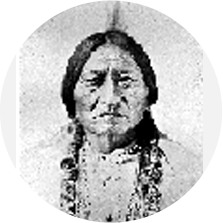The text below is excerpted from "Looking Back at Wounded Knee 1890" by Prof. Robert Venables, Cornell University. Published in "Northeast Indian Quarterly" Spring 1990.
It reads:
The following quotes were printed in "The Aberdeen Saturday Pioneer," a weekly newspaper published in Aberdeen, South Dakota. The first was published immediately after Sitting Bull's assassination by Indian Police Dec. 15, 1890.
"Sitting Bull, most renowned Sioux of modern history, is dead.
He was an Indian with a white man's spirit of hatred and revenge for those who had wronged him and his. In his day he saw his son and his tribe gradually driven from their possessions: forced to give up their old hunting grounds and espouse the hard working and uncongenial avocations of the whites. And these, his conquerors, were marked in their dealings with his people by selfishness, falsehood and treachery. What wonder that his wild nature, untamed by years of subjection, should still revolt? What wond r that a fiery rage still burned within his breast and that he should seek every opportunity of obtaining vengeance upon his natural enemies.
"The proud spirit of the original owners of these vast prairies inherited through centuries of fierce and bloody wars for their possession, lingered last in the bosom of Sitting Bull. With his fall the nobility of the Redskin is extinguished, and what few are left are a pack of whining curs who lick the hand that smites them. The Whites, by law of conquest, by justice of civilization, are masters of the American continent, and the best safety of the frontier settlements will be secured by the total annihilation of the few remaining Indians. Why not annihilation? Their glory has fled, their spirit broken, their manhood effaced; better that they die than live the miserable wretches that they are. History would forget these latter despicable beings, and speak, in later ages of the glory of these grand Kings of forest and plain that Cooper loved to heroism.
"We cannot honestly regret their extermination, but we at least do justice to the manly characteristics possessed, according to their lights and education, by the early Redskins of America."
The editorial is ambivalent at first, but concludes by calling for the extermination of American Indians.
The editor and publisher of "The Aberdeen Pioneer" who advocated genocide is well known: L. Frank Baum.
Only a decade after the massacre at Wounded Knee, Baum's book "The Wizard of Oz" (1900)
